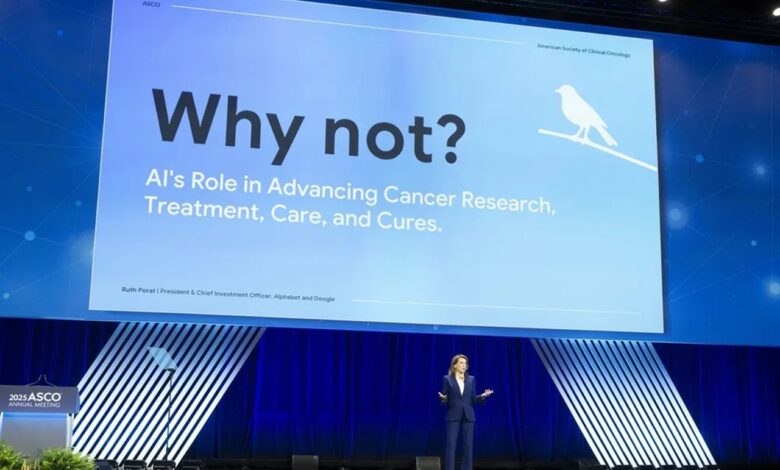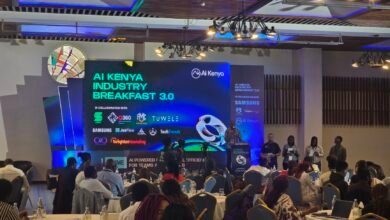
Insights At a Glance:
- Google’s AI innovations like AlphaFold are revolutionizing cancer research, accelerating drug discovery, and improving diagnostic accuracy.
- Kenya is leading Africa in breast cancer control, with major strides in affordability, early detection, and commitment to universal health coverage.
- The fusion of AI and local healthcare reforms presents a powerful opportunity to transform cancer care access and outcomes across Kenya.
Cancer might be one of humanity’s oldest enemies, but with the help of Google’s cutting-edge AI, we might just be gaining the upper hand — and not in the distant future, but right now.
In a packed room at the American Society of Clinical Oncology’s Annual Meeting in Chicago, Alphabet and Google’s President and Chief Investment Officer Ruth Porat took the stage and dropped a hopeful, human, and deeply personal bombshell: AI is not only reshaping economies — it’s also quietly transforming the war against cancer. Her key takeaway? Why not imagine a world where cancer is not just treatable, but preventable — or even curable? Big words. But Google’s AI is already walking the talk.
This isn’t just a Silicon Valley headline. It’s a story that lands close to home, where the fight against cancer has been gaining serious momentum.
From Labs to Lives: AI’s Role in Fighting Cancer
Porat’s message wasn’t the usual corporate keynote — it was personal. A two-time breast cancer survivor, she spoke candidly about fear, resilience, and the power of the word “manageable.” Her dream? A future where AI helps make cancer not only treatable but preventable and — dare we say it — curable.
“I learned that that word “manageable” was my friend,” she said, reflecting on her own experience with double mastectomy, chemotherapy, and radiation.
At the heart of this AI-powered movement is AlphaFold, Google DeepMind’s revolutionary tool that cracked the decades-old protein folding puzzle — a critical piece in understanding diseases like cancer. What used to take scientists years can now be done in days, mapping out over 200 million protein structures that help researchers design targeted drugs faster than ever. According to Google, over 2.5 million scientists in more than 190 countries are already using AlphaFold. That’s not just a win for the lab coats; it’s a win for humanity.
As Porat put it, this is more than a cool tech flex — it’s a rocket boost for cancer research.
Early Detection Gets a Tech Upgrade
Google isn’t just working in the lab — it’s showing up where it matters most: the clinic. Using deep learning, Google’s AI models are helping pathologists detect cancer in lymph nodes more accurately and in half the time. In medicine, time isn’t just money — it’s survival. And it doesn’t stop there. From spotting signs of diabetic retinopathy in India to acting as a supercharged assistant for radiologists poring over endless scans, AI is proving to be the sharpest tool in the medical kit.
Fighting Off a Different Cancer: Cyber Attacks
Porat also highlighted another front in the healthcare war — cybersecurity. Hospitals are now prime targets for hackers, and AI is playing defense here too, detecting threats early and shielding sensitive data. Because what good is a medical breakthrough if the patient data gets held for ransom?
Kenya’s Growing Momentum
This bold future fits perfectly with Kenya’s growing efforts in cancer control. Earlier this year, the World Health Organization ranked Kenya as Africa’s top country in breast cancer control, citing progress in screening, early detection, and treatment access. The country is also “enhancing cancer data collection and sharing to improve prevention, control, and patient outcomes” through global collaboration with the International Agency for Research on Cancer (IARC), a WHO-affiliated institution, and Oxford University.
Last month, Kenyan breast cancer patients got a major win when a new government deal slashed the cost of Roche’s breast cancer treatment drugs by up to 67%. Meanwhile, the Ministry of Health has been pushing forward with its Universal Health Coverage agenda, promising more affordable cancer care for everyone — whether in Nairobi, Kisumu, or even remote corners of Turkana. The Kisumu Cancer Conference in late 2024 marked a significant policy pivot, with Kenya committing to enhanced diagnostics, treatment, and palliative care services countrywide.
Enter AI, Kenya’s Opportunity
Here’s where Google’s vision and Kenya’s ambition meet.
Google is already deploying AI to help pathologists detect cancerous cells in gigapixel pathology slides — often identifying what the human eye might miss under pressure. The tech not only halves the time it takes to review slides, but also boosts diagnostic accuracy. In regions like rural Kenya, where oncologists are scarce, an AI assistant that never sleeps, never forgets, and never misses a metastasis could be a game-changer.
Ruth Porat highlighted this power of “agentic AI” — intelligent systems that assist doctors by auto-drafting paperwork, analyzing trial data, and surfacing treatment guidelines. Google’s collaboration with ASCO (the American Society of Clinical Oncology) has already birthed an AI tool that reads through 90-page treatment guidelines and instantly delivers clear answers. Think of it as Google Search, but for cancer specialists.
Doctors and nurses spend way too much time on admin (we’re talking up to 28 hours a week). That’s where Google’s agentic AI steps in — think of it as a digital sidekick that helps schedule appointments, summarize test results, and even keep up with clinical trial data. In some trials, nurses are getting back 40% of their time. That’s more face time with patients and less screen time with paperwork.
UNFPA and other stakeholders have long called for greater investment in reproductive cancer screening and prevention across sub-Saharan Africa. That call is getting louder — and smarter. As Kenya increases investment in screening tools, AI can help scale impact, especially in underserved communities. Google’s experience in using AI to detect diabetic retinopathy across Southeast Asia — with more than 700,000 scans done and 6 million planned — shows that this tech can scale in low-resource settings. Why not Kenya?
Why Not?
Porat wrapped her speech with the phrase “Why not?” — a nod to Demis Hassabis, the AI visionary behind AlphaFold. When asked how his team could possibly map 200 million protein structures, he simply said, “Why not?”
So why not imagine a Kenya where breast cancer is detected early — even before symptoms? Why not envision a local dispensary in Elgeyo Marakwet where AI assists nurses in real time? Why not imagine a day when cancer is no longer a death sentence in East Africa?






